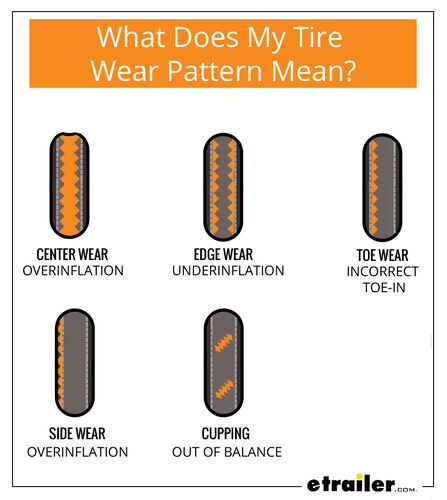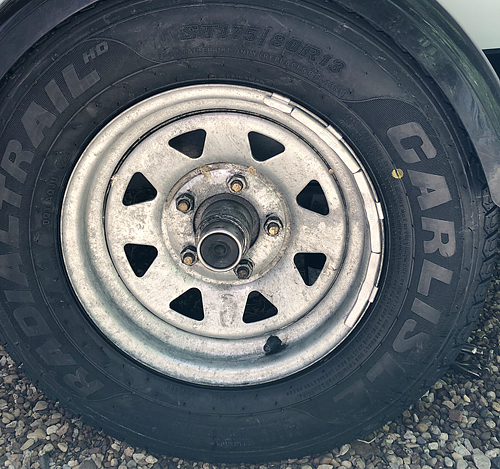Yes, you need to balance trailer tires for optimal performance and safety. Unbalanced tires can lead to uneven wear, poor handling, and increased fuel consumption.
Balancing trailer tires is crucial for maintaining a smooth ride and prolonging tire life. Uneven weight distribution can cause significant issues while towing, impacting vehicle handling and safety. Properly balanced tires enhance traction, reduce vibrations, and improve overall driving comfort.
Regular checks can prevent costly repairs and ensure a safer towing experience. Many recommend balancing trailer tires every time they are rotated or replaced.
Pay attention to tire wear patterns as well; unusual wear may indicate a balance issue. Keeping your tires in top condition enhances your towing efficiency and ensures safer journeys on the road.
Now the question is: do you need to balance trailer tires?
The Importance of Balancing Trailer Tires

Credit: www.etrailer.com
Balancing trailer tires is crucial for safety, but unbalanced tires can cause accidents. They lead to poor handling and increased stopping distances. Regular checks help prevent tire blowouts.
Longevity also matters. Unbalanced tires wear out unevenly. This can lead to costly replacements. Proper balancing extends the life of your tires. It saves you money in the long run.
Balancing ensures better fuel efficiency. This means your trailer will use less fuel. Fewer trips to the gas station are a big plus.
Signs Your Trailer Tires Need Balancing
Vibration and noise are clear signs your trailer tires need balancing. Unusual vibrations can be felt in the steering wheel. Excessive noise may come from the tires while driving. Both indicate that the tires are not balanced properly.
Irregular tire wear is another warning sign. Tires may wear down unevenly across the surface. This can lead to a shorter tire lifespan.
Ignoring these signs can lead to serious problems. Always inspect your trailer tires. Keeping them balanced ensures a safer and smoother ride.
How To Balance Trailer Tires?

Credit: texasflycaster.com
Balancing trailer tires is important for safe driving. It improves tire life and helps with fuel efficiency.
Choose the right method for balancing. You can use traditional weights or liquid balancers. Weights attach to the rim. Liquid balancers spread evenly inside the tire.
Follow this simple step-by-step guide:
| Step | Description |
|---|---|
| 1 | Check tire pressure before balancing. |
| 2 | Remove the tire from the trailer. |
| 3 | Use a balancing machine or weights. |
| 4 | Reinstall the tire and check again. |
Regularly check your trailer tires. Proper maintenance keeps your travels safe and enjoyable.
Preventive Measures And Maintenance

Credit: centramatic.com
Regular checks on trailer tires are essential for safe travel. Inspect tires for wear and tear. Look for any visible cracks or bulges. Ensure that the tire pressure is at the correct level. Under-inflated tires can lead to accidents.
Proper tire storage helps maintain tire health. Store tires in a cool, dry place away from direct sunlight. Keeping them in a sealed bag can prevent damage. Rotate tires every few months to ensure even wear. This simple action extends their lifespan.
Common Myths Debunked
Balancing trailer tires is important for all vehicles, not just high-speed ones. Many people believe only cars that travel fast need balancing. This is a myth.
Trailers also experience vibration and uneven wear. Properly balanced tires help improve stability and handling. They also enhance fuel efficiency.
Some think once tires are balanced, they never need it again. This is not true. Tires can lose balance over time due to wear or damage.
Regular checks ensure tires remain balanced and safe. Proper maintenance helps avoid unnecessary repairs and extends tire life.
Final Words: Do trailer tires need to be balanced?
Yes, tires on trailers should be balanced. Unbalanced trailer tires cause vibration, uneven wear, and added stresses to the wheel bearings and suspension components. Although some believe that balancing lower-speed trailer tires is not required, proper balance can prevent premature wear and possible safety concerns, particularly at highway speeds. Most professionals in the tire trade recommend balancing the tires on trailers, just as one would with any other vehicle tire.
FAQs about Trailer Tires
Should I balance trailer tires?
Yes, you should balance trailer tires. Balanced tires are important for safety, as this minimizes vibration and prevents uneven wear that may lead to early tire failure. Proper balancing offers stability at highway speeds, better fuel efficiency, and protects the wheel bearings and suspension components against excessive stress. Although some will say it’s not necessary on low-speed trailers, balancing is pretty inexpensive insurance against possible problems and is suggested for any trailer used regularly at highway speeds.
What happens if you don’t balance trailer tires?
A number of problems can arise from unbalanced trailer tires. The vibration from imbalanced tires causes uneven wear, which reduces tire life and can cause blowouts. This vibration also puts additional stress on the trailer’s suspension components and wheel bearings, leading to premature failure. The shaking can affect cargo stability and make towing more difficult and dangerous. Over time, these issues result in higher maintenance costs and increased safety risks.
How much weight can 4 class c trailer tires carry?
The standard Class C trailer tire with a rating of ST225/75R15 would have an average capacity ranging between 2,540 and 2,830 pounds per tire at maximum inflation, depending on whether the tire’s load rating was in load range D or E. Four properly maintained Class C trailer tires could then theoretically support 10,160 to 11,320 pounds total. However, always check your specific tire’s sidewall for exact load ratings and never exceed manufacturer specifications.
Can you run trailer tires on a pickup?
Although installing trailer tires on a pickup truck is physically possible, it’s not recommended or safe. Trailer tires are for trailing applications and have different load distributions and handling compared to the tires of passenger vehicles. Many of them feature stiffer sidewalls and are not designed to handle those steering, braking, and cornering forces that truck tires need to manage. For safety reasons, always employ tires designed specifically for your pickup truck.
How long do trailer tires last?
The average life for trailer tires is 3-5 years or about 5,000 to 12,000 miles, depending on use and maintenance. But even if the tread depth remains good, tires should be replaced after 5-6 years due to rubber degradation from UV exposure and aging, regardless of mileage. The key to extending tire life and safety is regular inspection for signs of dry rot, proper inflation, and even weight distribution.
How much does a tractor trailer tire weigh?
A standard tractor-trailer tire typically weighs between 110 to 120 pounds (50-54 kg) when new. However, the weight can vary depending on the specific type and size of the tire. Super single tires, which are wider and sometimes used in place of dual tires, can weigh up to 200 pounds (91 kg). The most common size, 295/75R22.5, usually weighs around 115 pounds (52 kg).
How long are trailer tires good for?
Trailer tires typically last 3-5 years regardless of mileage, as they deteriorate due to age and environmental factors even when not in use. However, with proper storage and maintenance, they might last up to 8-10 years. It’s crucial to check for signs of aging like cracking or dry rot. Many manufacturers and safety experts recommend replacing trailer tires every 5 years regardless of their appearance or remaining tread.
Are Carlisle trailer tires good?
Carlisle generally enjoys a good reputation for reliable, budget-friendly trailer tires. They are considered to be particularly decent for lighter-duty trailers and recreational vehicles. Though not quite as durable as the Goodyear models, they offer acceptable performance and value for typical trailer duty. There have been reports of quality inconsistencies. Regardless of which brand you go with, proper inflation and not exceeding the load-carrying capacity will get you the best performance.
What is the best trailer tire?
A good trailer tire depends on what one wants and needs in it: load-carrying capability, durability, and specific road conditions. Goodyear Endurance-strong and lasting. Carlisle Radial Trail HD provides the tow with less vibration and grip. Maxxis M8008 performs very nicely for heavy carrying and stability.
Can you put car tires on a trailer?
Car tires can be fitted on a trailer, but they are not the best choice. Trailer tires are designed to handle heavy loads and reduce swaying. Car tires have softer sidewalls that can easily cause instability. Trailer tires also tend to last longer when weight is constantly applied to them. Using car tires may lead to faster wear and poor performance. For safety and durability, trailer-specific tires work better.
What is load range d on trailer tires?
Similarly, Load Range D on trailer tires means they will support more weight than Load Range C. In most instances, they have four-ply and a higher PSI rating, topping out at something like 65 PSI. Thus, they also support heavier weights without wearing quickly. The choice of the proper load range acts to prevent possible blowouts or loss of the trailer’s stability.
What psi for trailer tires?
Trailer tire pressure depends on the tire type and load. Most trailer tires need 50 to 80 PSI. Check the sidewall for the recommended PSI. Keep tires inflated to the maximum PSI listed for safe towing. Low pressure can cause blowouts, while too much air reduces traction. Use a quality gauge for accuracy. Proper inflation helps tires last longer and improves fuel efficiency.
